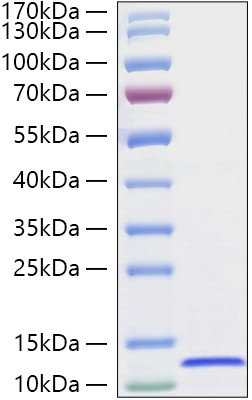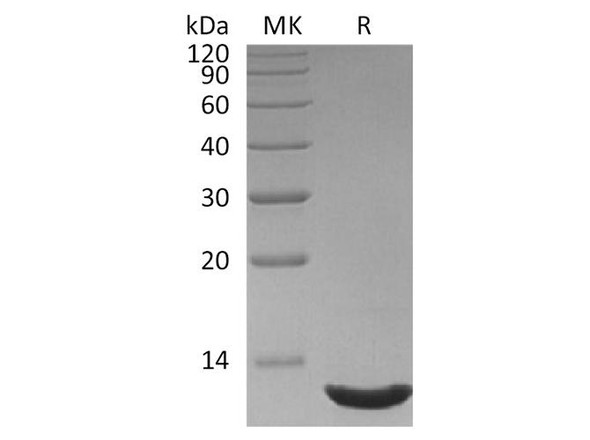Description
Recombinant Canine CXCL12/SDF-1 Protein
The Recombinant Canine CXCL12/SDF-1 Protein is a high-quality recombinant protein produced for advanced research applications in molecular biology and biotechnology. This protein serves as a critical reagent in various experimental contexts, including functional studies, binding assays, and therapeutic development programs, providing researchers with a standardized and reliable tool for investigating protein function and interactions.
This product (SKU: RPCB1962) is produced using E.coli and features a No tag tag for convenient detection and purification. The protein exhibits a calculated molecular weight of 8.6 kDa with an observed molecular weight of 10-14 kDa under denaturing conditions, achieving ≥ 95 % as determined by SDS-PAGE., ensuring exceptional quality and consistency for research applications.
Key Features
| High Purity by Affinity Chromatography | |
| Mammalian & Bacterial Expression Systems | |
| High lot-to-lot consistency via strict QC |
| Product Name: | Recombinant Canine CXCL12/SDF-1 Protein |
| SKU: | RPCB1962 |
| Size: | 50 μg |
| Reactivity: | Canine |
| Synonyms: | Stromal cell-derived factor 1, SDF-1, C-X-C motif chemokine 12, CXCL12 |
| Tag: | No tag |
| Expression Host: | E.coli |
| Calculated MW: | 8.6 kDa |
| Observed MW: | 10-14 kDa |
| Gene ID: | 449622 |
| Protein Description: | High quality, high purity and low endotoxin recombinant Recombinant Canine CXCL12/SDF-1 Protein (RPCB1962), tested reactivity in E.coli and has been validated in SDS-PAGE.100% guaranteed. |
| Endotoxin: | Please contact us for more information. |
| Purity: | ≥ 95 % as determined by SDS-PAGE. |
| Formulation: | Lyophilized from a 0.22 μm filtered solution of 50 mM Tris, 500 mM NaCl, pH 8.0. Contact us for customized product form or formulation. |
| Reconstitution: | Please contact us for reconstitution instructions. |
| Storage: | Store at -20℃.Store the lyophilized protein at -20℃ to -80 ℃ up to 1 year from the date of receipt. After reconstitution, the protein solution is stable at -20℃ for 3 months, at 2-8℃ for up to 1 week. |
The human stromal cell-derived factor-1 (SDF1), also known as CXCL12, is a small (8 kDa) cytokine highly conserved chemotactic cytokine belonging to the large family of CXC chemokines. SDF1 is expressed in two isoforms from a single gene that encodes two splice variants, SDF1α and SDF1β, which are identical except for the four residues present in the C-terminus of SDF1β but absent from SDF1α. The chemokine CXCL12 [stromal cell-derived factor-1 (SDF-1)] binds primarily to CXC receptor 4 (CXCR4; CD184). The binding of CXCL12 to CXCR4 induces intracellular signaling through several divergent pathways initiating signals related to chemotaxis, cell survival and/or proliferation, increase in intracellular calcium, and gene transcription. CXCL12 and CXCR4 that have been widely characterized in peripheral tissues and delineate their main functions in the CNS. Extensive evidence supports CXCL12 as a key regulator for early development of the CNS. In the mature CNS, CXCL12 modulates neurotransmission, neurotoxicity and neuroglial interactions. CXCL12 has crucial roles in the formation of multiple organ systems during embryogenesis and in the regulation of bone marrow haematopoiesis and immune function in the postnatal organism. Although considered an important factor in normal bone metabolism, recent studies implicate CXCL12 in the pathogenesis of several diseases involving the skeleton, including rheumatoid arthritis and cancers that metastasize to bone. The CXCL12/CXCR4 axis is involved in tumor progression, angiogenesis, metastasis, and survival. Pathologically enhanced CXCL12 signaling may promote the formation of new vessels through recruiting circulating endothelial progenitor cells or directly enhancing the migration/growth of endothelial cells. Therefore, CXCL12 signaling represents an important mechanism that regulates brain tumor angiogenesis/vasculogenesis and may provide potential targets for anti-angiogenic therapy in malignant gliomas.







